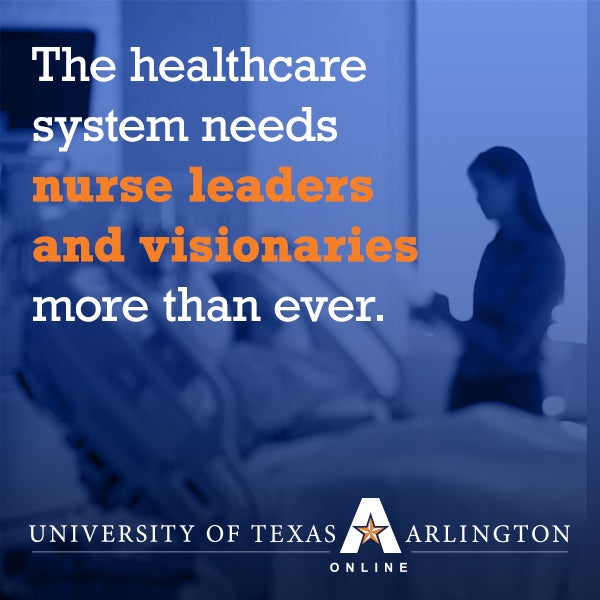
Healthcare is at an exciting crossroads. More Americans have access to healthcare and are living longer than ever before. Patients will have more complicated needs, and the healthcare environment will also become more complex. Now more than ever, there is a need for nurses with advanced education.
According to the National Nursing Workforce Survey, 2022 was the first year that over 70% of registered nurses (RNs) had their Bachelor of Science in Nursing (BSN) or higher. Given this, nurses looking to advance into high-level roles should consider earning a Master of Science in education to be competitive on the job market.
Plus, of course, Advanced Practice Registered Nurse (APRN) roles and numerous nursing leadership and education roles require at least an MSN. Making the jump from RN to MSN can seem intimidating, but flexible, accelerated bridge program options like the online RN to MSN program from The University of Texas at Arlington (UTA) can help working nurses achieve their educational and professional goals with relative ease.
The Aging Population Drives the Need for Nurses With Advanced Education
According to many estimates, more than 20% of the U.S. population will be age of 65 and over by 2030. The U.S. Census Bureau projects that percentage will increase to nearly 23% by 2050. U.S. citizens are living longer than ever before due to the availability of new treatments for complex health issues that previously had none.
Further, due to the Baby Boomer generation, more Americans will turn 65 between now and 2027 than in any other time in history. This massive influx of aging patients will create an enormous need for highly educated nurses. The U.S. Bureau of Labor Statistics (BLS) cites this as the primary factor driving 29% growth in the medical and health services manager occupational category, placing it 6th among the fastest growing occupations in the country.
The Need for MSN-prepared Nurses Is on the Rise
Industry organizations like the American Association of Colleges of Nursing promote the BSN as the minimum level of preparation for entry level nursing roles, and many employers agree. Yet overall demand for MSN-prepared nurses is also on the rise, as is demand for jobs that require a graduate degree in nursing.
For instance, many of the rapidly growing medical and health services manager roles mentioned above are administrative-level positions that require MSN-preparation. BLS also reports that employment of nurse practitioners — another role that requires an MSN — will increase by 46% between 2023 and 2033, making it the third fastest growing U.S. occupation.
Provider Shortages Drive Demand Higher
The Affordable Care Act pushed preventive care to the forefront of healthcare. Promoting and providing preventative care is largely the purview of nurses and primary care providers, both of which are in short supply across the country. These shortages limit access to care and health equity for underserved populations.
Nurse practitioners and other APRNs in team-based models of care are well suited to address primary care provider shortages, a critical factor driving occupational growth, per BLS. These highly educated nurses are perfectly poised to meet the demands of patients that need access to quality, affordable healthcare where primary care providers are in short supply.
In fact, many states are increasing practice authority for nurse practitioners in order that they can provide primary care for patients with complete autonomy (not reliant on the supervision of a physician). Thus, in certain states, APRNs with appropriate credentials can open their own healthcare practices and satisfy their community’s need for primary care.
Advance Nursing Practice With an Online RN to MSN Degree
Many professionals who plan to capitalize on the growing demand for highly educated nurses will need to continue their education at the MSN level. UTA’s CCNE-accredited online RN to MSN program offers the flexibility in scheduling and delivery that working nurses need to navigate school, work and life effectively.
Nurses in the 21st century will need advanced skill in technology and extensive knowledge of healthcare policy, leadership and research. Nurses of the future will understand the value of evidence-based practice and be the leaders who help implement new research for better patient outcomes. These nurses will understand the value of collaboration and coordination across multiple interdisciplinary teams.
The future is very bright for highly educated nurses, especially those completing RN to MSN programs. The healthcare system needs nurse leaders and visionaries more than ever. Those nurses will manage complex problems and make informed decisions, improving their organization’s impact on patient care and the healthcare environment in general.
Learn more about UTA’s online RN to MSN program.